Why Regular Foot Check-Ups Are Important for Older Adults
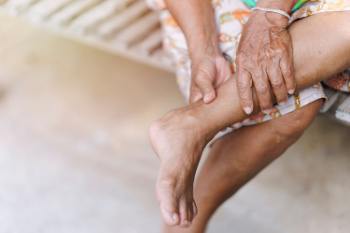 Regular foot check-ups are important for older adults to help identify potential problems early on. Getting treatment for any issues also prevents these problems from escalating into more serious conditions. As people age, changes in foot structure, skin integrity, and circulation can occur, making the feet more susceptible to various issues, such as pain and cracked heels. Regular check-ups become especially important for those with chronic conditions like diabetes or arthritis, as these can significantly impact foot health. Certain conditions, like plantar fasciitis and osteoarthritis, become more likely with repetitive movement and the natural wear and tear that comes with aging. Podiatrists can assess the risk of developing complications, provide personalized advice on footwear, and offer guidance on preventive measures. If you have concerns about your foot health as an older adult, or if you are experiencing foot pain, it is suggested that you schedule an appointment with a podiatrist.
Regular foot check-ups are important for older adults to help identify potential problems early on. Getting treatment for any issues also prevents these problems from escalating into more serious conditions. As people age, changes in foot structure, skin integrity, and circulation can occur, making the feet more susceptible to various issues, such as pain and cracked heels. Regular check-ups become especially important for those with chronic conditions like diabetes or arthritis, as these can significantly impact foot health. Certain conditions, like plantar fasciitis and osteoarthritis, become more likely with repetitive movement and the natural wear and tear that comes with aging. Podiatrists can assess the risk of developing complications, provide personalized advice on footwear, and offer guidance on preventive measures. If you have concerns about your foot health as an older adult, or if you are experiencing foot pain, it is suggested that you schedule an appointment with a podiatrist.
If you need your feet checked, contact Harvey Jacobs, DPM of Quality Foot Care Center. Our doctor will attend to all of your foot and ankle needs and provide you with quality treatment.
Geriatrics and Podiatry
When people age, some common issues that may occur are bone density loss, dry skin, poor circulation, and rough brittle nails. These issues may also affect your foot health if the necessary steps are not taken to alleviate the problems.
It is important to take care of your feet because feet that are injured or diseased can affect your overall health. Having painful feet hinders your ability to do daily activities or may decrease your willingness to do the things that you need to do.
Visiting Your Geriatrician
As we age, health problems become more likely, so it is essential to visit your doctor for check-ups to ensure that you are doing the best you can to take care of your health. It is recommended to check your feet frequently for any possible cuts, bruises, swelling, corns or any other irregularities.
Taking Care of Elderly Feet
Cracked or dry feet can be treated by applying moisturizer often. It is also important not to wear old socks because the older the sock is, the higher the possibility there will be that there is bacteria there. Wear fresh socks and make sure they fit properly.
Proper foot health means that you can have a more active lifestyle and you will not be bogged down by pain. Foot health also leads to good circulation, which is paramount for overall health.
If you have any questions, please feel free to contact our office located in Somerset, NJ . We offer the newest diagnostic tools and technology to treat your foot and ankle needs.
Nighttime Foot Pain
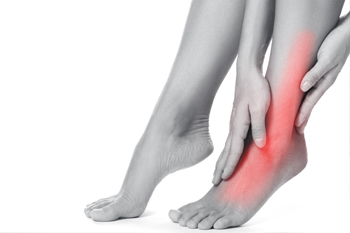
Nighttime foot pain can stem from various sources, including lifestyle factors and medical conditions. Whether it's a dull, persistent ache or a throbbing sensation in different areas of the feet, such discomfort can significantly disrupt sleep and worsen with poor rest. Factors such as prolonged standing or sitting, wearing ill-fitting footwear, and certain sleeping positions can contribute to this discomfort. Additionally, conditions like Morton’s neuroma, plantar fasciitis, sciatica, fibromyalgia, diabetes, and peripheral neuropathy can all contribute to nocturnal foot pain. Treatment options range from simple lifestyle adjustments, like staying hydrated and performing gentle foot exercises, to medical interventions such as anti-inflammatory medications, special exercises, and orthotics interventions. If you have nighttime foot pain, it is suggested that you make an appointment with a podiatrist for a proper diagnosis and to address any underlying conditions you might have.
Foot Pain
Foot pain can be extremely painful and debilitating. If you have a foot pain, consult with Harvey Jacobs, DPM from Quality Foot Care Center. Our doctor will assess your condition and provide you with quality foot and ankle treatment.
Causes
Foot pain is a very broad condition that could be caused by one or more ailments. The most common include:
- Bunions
- Hammertoes
- Plantar Fasciitis
- Bone Spurs
- Corns
- Tarsal Tunnel Syndrome
- Ingrown Toenails
- Arthritis (such as Gout, Rheumatoid, and Osteoarthritis)
- Flat Feet
- Injury (from stress fractures, broken toe, foot, ankle, Achilles tendon ruptures, and sprains)
- And more
Diagnosis
To figure out the cause of foot pain, podiatrists utilize several different methods. This can range from simple visual inspections and sensation tests to X-rays and MRI scans. Prior medical history, family medical history, and any recent physical traumatic events will all be taken into consideration for a proper diagnosis.
Treatment
Treatment depends upon the cause of the foot pain. Whether it is resting, staying off the foot, or having surgery; podiatrists have a number of treatment options available for foot pain.
If you have any questions, please feel free to contact our office located in Somerset, NJ . We offer the newest diagnostic and treatment technologies for all your foot care needs.
Custom Orthotics For Seniors

Age gracefully and move freely with Custom Orthotics. For seniors seeking to maintain their independence, Custom Orthotics offer the stability and comfort essential for daily activities. Custom-tailored to your feet, they provide support, reduce pain, and enhance mobility, ensuring you're always on sure footing. Don't let age-related foot concerns hold you back. With Custom Orthotics, embrace every golden moment with confidence. Call today to schedule an appointment.
Myths About Custom Orthotics
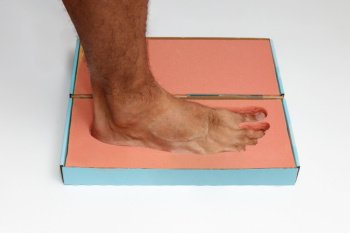
Custom foot orthoses have a rich history, dating back to the mid-19th century when Lewis Durlacher created molded leather devices to address foot issues for Queen Victoria. Over the years, several myths have emerged about the function and effects of custom orthoses. First, custom orthotics are personalized medical devices designed to optimize foot and lower extremity function by modifying ground reaction forces' timing, location, and magnitude. They do not force the foot into specific joint positions but work with their unique morphology, stiffness, and cushioning properties to achieve therapeutic goals. Custom foot orthoses serve various purposes, from relieving diabetic neuropathic ulcers to reducing tension stress in conditions like plantar fasciitis. They also redirect ground reaction forces to prevent bending moments responsible for stress fractures and other issues. That there is one best way to design custom orthoses is another myth. The flexibility of custom orthoses allows for tailored solutions for different pathologies. Lastly, the notion that custom foot orthoses weaken feet over time lacks scientific backing. In fact, research suggests that they can enhance foot muscle activation. If you would like to understand more about how custom orthotics might help you, it is suggested that you make an appointment with a podiatrist.
If you are experiencing discomfort in your feet and would like to try custom orthotics, contact Harvey Jacobs, DPM from Quality Foot Care Center. Our doctor can provide the care you need to keep you pain-free and on your feet.
What Are Custom Orthotics?
Custom orthotics are inserts you can place into your shoes to help with a variety of foot problems such as flat feet or foot pain. Orthotics provide relief and comfort for minor foot and heel pain.
Over-the-Counter Inserts
Shoe inserts come in a wide variety and are used to treat foot pain, heel pain, and minor problems. For example, arch supports can be inserted into your shoes to help correct overarched or flat feet, while gel insoles are often used because they provide comfort and relief from foot and heel pain by alleviating pressure.
Prescription Orthotics
If over-the-counter inserts don’t work for you or if you have a more severe foot concern, it is possible to have your podiatrist prescribe custom orthotics. These high-quality, custom inserts are designed to treat problems such as abnormal motion, plantar fasciitis, and severe forms of heel pain. They can even be used to help patients suffering from diabetes by treating foot ulcers and painful calluses and are usually molded to your feet individually, which allows them to provide full support and comfort.
If you're experiencing minor to severe foot or heel pain, it’s recommended to speak with your podiatrist about the possibility of using custom orthotics or shoe inserts. A podiatrist can determine which type of custom orthotic or shoe insert is right for you and help you take the first steps toward being pain-free.
If you have any questions please contact our office located in Somerset, NJ . We offer the newest diagnostic and treatment technologies for all your foot and ankle needs.
Root Causes of Heel Pain

Understanding the root causes of heel pain is essential for effective treatment. Mechanical factors such as acute injuries, like a ruptured plantar fascia, are common causes of heel pain. Degenerative conditions, such as plantar fasciitis or calcaneal stress fractures, also may significantly affect the heel. Neurologic causes, including nerve compression and inflammation of the Achilles tendon, can cause heel discomfort, especially during activities. Rheumatologic conditions, such as psoriatic arthritis or rheumatoid arthritis, can lead to chronic inflammation and persistent heel pain. Differentiating between these causes is vital for tailored treatment plans, which may involve orthotic devices, certain exercises, or reducing pressure on affected tendons during acute phases. Additionally, addressing contributing factors like foot pronation, inadequate footwear, or high-impact physical activities is important for long-term management. If you are experiencing heel pain that interferes with your daily activities, it is suggested that you schedule an appointment with a podiatrist for a full exam and diagnosis, followed by suggesting correct treatment options for you.
Many people suffer from bouts of heel pain. For more information, contact Harvey Jacobs, DPM of Quality Foot Care Center. Our doctor can provide the care you need to keep you pain-free and on your feet.
Causes of Heel Pain
Heel pain is often associated with plantar fasciitis. The plantar fascia is a band of tissues that extends along the bottom of the foot. A rip or tear in this ligament can cause inflammation of the tissue.
Achilles tendonitis is another cause of heel pain. Inflammation of the Achilles tendon will cause pain from fractures and muscle tearing. Lack of flexibility is also another symptom.
Heel spurs are another cause of pain. When the tissues of the plantar fascia undergo a great deal of stress, it can lead to ligament separation from the heel bone, causing heel spurs.
Why Might Heel Pain Occur?
- Wearing ill-fitting shoes
- Wearing non-supportive shoes
- Weight change
- Excessive running
Treatments
Heel pain should be treated as soon as possible for immediate results. Keeping your feet in a stress-free environment will help. If you suffer from Achilles tendonitis or plantar fasciitis, applying ice will reduce the swelling. Stretching before an exercise like running will help the muscles. Using all these tips will help make heel pain a condition of the past.
If you have any questions please contact our office located in Somerset, NJ . We offer the newest diagnostic and treatment technologies for all your foot and ankle needs.
It's Time for Beautiful Feet
How to Find Foot Pain Relief From Arthritis
 There are multiple varieties of arthritis, and a challenge many of them share in common is foot pain. Arthritic foot care is important to finding relief from arthritis, a condition that has no cure. Luckily, help from a podiatrist, lifestyle modifications, and physical therapy can all contribute to happier feet. If you have foot pain, it is suggested you consult a podiatrist who can provide personalized guidance based on your condition. They may recommend suitable footwear with good arch support and cushioning to reduce pressure on the affected joints. Podiatrists may also recommend regular stretching exercises, such as gentle calf stretches and toe exercises, which can help maintain flexibility and alleviate stiffness in the feet. Lifestyle modifications, such as losing weight and switching to lower-impact exercise, can also be important to arthritic foot care. Over-the-counter or prescribed medications can be part of the treatment plan, and in some cases, your podiatrist may suggest custom orthotic inserts to provide additional support to your feet. If you are experiencing foot pain from arthritis, it is suggested that you make regular appointments with a podiatrist for ongoing care.
There are multiple varieties of arthritis, and a challenge many of them share in common is foot pain. Arthritic foot care is important to finding relief from arthritis, a condition that has no cure. Luckily, help from a podiatrist, lifestyle modifications, and physical therapy can all contribute to happier feet. If you have foot pain, it is suggested you consult a podiatrist who can provide personalized guidance based on your condition. They may recommend suitable footwear with good arch support and cushioning to reduce pressure on the affected joints. Podiatrists may also recommend regular stretching exercises, such as gentle calf stretches and toe exercises, which can help maintain flexibility and alleviate stiffness in the feet. Lifestyle modifications, such as losing weight and switching to lower-impact exercise, can also be important to arthritic foot care. Over-the-counter or prescribed medications can be part of the treatment plan, and in some cases, your podiatrist may suggest custom orthotic inserts to provide additional support to your feet. If you are experiencing foot pain from arthritis, it is suggested that you make regular appointments with a podiatrist for ongoing care.
Arthritis can be a difficult condition to live with. If you are seeking treatment, contact Harvey Jacobs, DPM from Quality Foot Care Center. Our doctor can provide the care you need to keep you pain-free and on your feet.
Arthritic Foot Care
Arthritis is a joint disorder that involves the inflammation of different joints in your body, such as those in your feet. Arthritis is often caused by a degenerative joint disease and causes mild to severe pain in all affected areas. In addition to this, swelling and stiffness in the affected joints can also be a common symptom of arthritis.
In many cases, wearing ill-fitting shoes can worsen the effects and pain of arthritis. Wearing shoes that have a lower heel and extra room can help your feet feel more comfortable. In cases of rheumatoid arthritis, the arch in your foot may become problematic. Buying shoes with proper arch support that contour to your feet can help immensely.
Alleviating Arthritic Pain
- Exercises that stretch the foot can prevent further pain and injury and increase mobility
- Most of the pain can be alleviated with anti-inflammatory drugs, heat, and topical medications
- Massages can help temporarily alleviate pain.
It is best to see your doctor for the treatment that is right for your needs and symptoms. Conditions vary, and a podiatrist can help you determine the right method of care for your feet.
If you have any questions, please feel free to contact our office located in Somerset, NJ . We offer the newest diagnostic tools and technology to treat your foot and ankle needs.
Causes of Puffy and Swollen Feet
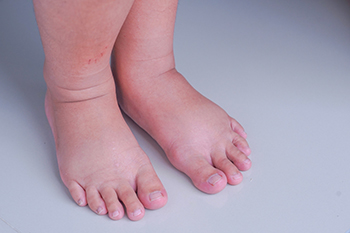
Swollen feet, a common occurrence, can be attributed to various factors that impact the delicate balance of fluid regulation in the body. One primary cause is fluid retention, often linked to prolonged periods of standing or sitting, particularly in hot weather. The force of gravity hinders efficient circulation, leading to fluid pooling in the lower extremities. Additionally, dietary choices high in sodium can contribute to water retention, exacerbating swelling. Injuries or trauma, such as sprains or fractures, may trigger localized swelling as the body's natural response to inflammation. Conditions like venous insufficiency or deep vein thrombosis disrupt blood flow, promoting fluid accumulation. Pregnancy and hormonal fluctuations can also lead to swelling in the feet. If your feet are swollen, it is suggested that you consult a podiatrist who can determine what the cause is, and offer appropriate relief methods.
Swollen feet can be a sign of an underlying condition. If you have any concerns, contact Harvey Jacobs, DPM of Quality Foot Care Center. Our doctor can provide the care you need to keep you pain-free and on your feet.
Swollen feet are a common ailment among pregnant women and people who stand or sit for extended periods. Aging may increase the possibility of swollen feet and patients who are obese often notice when their feet are swelling too. There may be medical reasons why swollen feet occur:
- Phlebitis - A condition that causes the veins to become inflamed and can also cause leg pain.
- Liver disease - This may lead to low blood levels of albumin which is a protein. This can cause fluid in the blood to pass into the tissues and several areas of the body can become swollen.
- Heart failure - When the heart doesn’t pump properly the blood that is normally pumped back to the heart can pool in the veins of the legs causing swollen feet.
- Kidney disease - One of the main functions of the kidneys is releasing excess fluid in the body. This type of condition can make it difficult for the kidneys to function properly, and as a result the feet may become swollen.
- Deep-vein thrombosis (DVT)- This is a serious condition where blood clots form in the veins of the legs. They can block the return of blood from the legs to the heart which may cause the feet to swell. It is important to be treated by a podiatrist if this condition is present.
Swollen feet can also be caused by bone and tendon conditions, including fractures, arthritis, and tendinitis. Additionally, there may be skin and toenail conditions and an infection may cause the feet to swell. Patients who take medicine to treat high blood pressure may be prone to getting swollen feet.
Many patients elevate their feet to help relieve the swelling and this is generally a temporary remedy. When a podiatrist is consulted the reason behind the swelling can be uncovered and subsequently treated.
If you have any questions please feel free to contact our office located in Somerset, NJ . We offer the newest diagnostic tools and technology to treat your foot and ankle needs.
Symptoms and Long-Term Implications of a Broken Toe
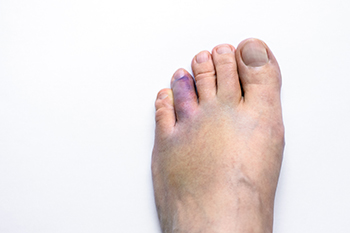
A broken toe, though seemingly minor, can yield noticeable symptoms and potential long-term complications. Immediate signs include pain, swelling, and bruising around the affected toe. Limited mobility and difficulty bearing weight are common, making daily activities challenging. If left untreated, a broken toe may lead to complications, such as deformities where the toe heals in a misaligned position. Chronic pain can persist, hindering mobility. In some cases, arthritis may develop, accelerating joint degeneration over time. Nerve damage is another potential consequence, causing tingling or numbness. Seeking prompt medical attention, including having X-rays taken for an accurate diagnosis, is vital to ensure proper realignment and minimize the risk of enduring complications. If you have endured a broken toe, it is suggested that you visit a podiatrist who can effectively treat this condition and guide you toward avoiding long-term complications.
Broken toes may cause a lot of pain and should be treated as soon as possible. If you have any concerns about your feet, contact Harvey Jacobs, DPM from Quality Foot Care Center. Our doctor will treat your foot and ankle needs.
What Is a Broken Toe?
A broken toe occurs when one or more of the toe bones of the foot are broken after an injury. Injuries such as stubbing your toe or dropping a heavy object on it may cause a toe fracture.
Symptoms of a Broken Toe
- Swelling
- Pain (with/without wearing shoes)
- Stiffness
- Nail Injury
Although the injured toe should be monitored daily, it is especially important to have a podiatrist look at your toe if you have severe symptoms. Some of these symptoms include worsening or new pain that is not relieved with medication, sores, redness, or open wounds near the toe.
If you have any questions, please feel free to contact our office located in Somerset, NJ . We offer the newest diagnostic and treatment technologies for all your foot care needs.
Understanding Foot Stress Fractures
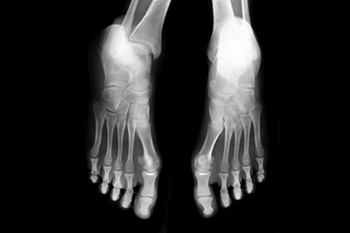
A foot stress fracture, a microscopic crack in a bone, can bring discomfort and disruption to one's daily activities. Typically caused by repetitive stress and overuse, these fractures often occur in weight-bearing bones, such as the metatarsals. These bones often endure more force than they can handle, leading to tiny cracks that, when compounded over time, manifest as stress fractures. Athletes engaging in high-impact activities, dancers, and military personnel are particularly susceptible due to the repetitive nature of their routines. Factors like sudden increases in activity intensity, improper footwear, or inadequate recovery periods can elevate the risk. Early recognition of symptoms such as localized pain, swelling, and tenderness is essential for timely intervention. Adopting preventive measures, such as a gradual increase in activity levels, and incorporating rest into routines can significantly decrease the risk of foot stress fractures. If you have developed a foot stress fracture, it is suggested that you confer with a podiatrist who can offer the treatment method that is right for you.
Stress fractures occur when there is a tiny crack within a bone. To learn more, contact Harvey Jacobs, DPM from Quality Foot Care Center. Our doctor can provide the care you need to keep you pain free and on your feet.
How Are They Caused?
Stress fractures are the result of repetitive force being placed on the bone. Since the lower leg and feet often carry most of the body’s weight, stress fractures are likely to occur in these areas. If you rush into a new exercise, you are more likely to develop a stress fracture since you are starting too much, too soon. Pain resulting from stress fractures may go unnoticed at first, however it may start to worsen over time.
Risk Factors
- Gender – They are more commonly found in women compared to men.
- Foot Problems – People with unusual arches in their feet are more likely to develop stress fractures.
- Certain Sports – Dancers, gymnasts, tennis players, runners, and basketball players are more likely to develop stress fractures.
- Lack of Nutrients – A lack of vitamin D and calcium may weaken the bones and make you more prone to stress fractures
- Weak Bones – Osteoporosis can weaken the bones therefore resulting in stress fractures
Stress fractures do not always heal properly, so it is important that you seek help from a podiatrist if you suspect you may have one. Ignoring your stress fracture may cause it to worsen, and you may develop chronic pain as well as additional fractures.
If you have any questions, please feel free to contact our office located in Somerset, NJ . We offer the newest diagnostic and treatment technologies for all your foot care needs.
More...
Heel Pain Can Be Treated!
Essential Foot Stretches for Improved Flexibility and Comfort

Maintaining optimal foot health is critical for overall well-being, and incorporating regular foot stretches into your routine can make a significant difference. Start with a toe stretch by sitting back on your heels, gently pressing each toe into the floor. The plantar fascia stretch involves extending your toes up against a wall, providing relief to the bottom of your feet. A simple seated ankle stretch can be achieved by rotating your ankles clockwise and counterclockwise, promoting flexibility. The calf stretch, done by leaning against a wall with one foot forward and the other back, targets the calf muscles and Achilles tendon. Lastly, the towel stretch involves sitting with your legs extended, wrapping a towel around your toes, and gently pulling it towards you, stretching the muscles along the bottom of your feet. Incorporating these five foot stretches into your daily routine can enhance flexibility, alleviate tension, and contribute to overall foot comfort. If you are seeking additional information about effective foot stretches, it is suggested that you visit a podiatrist.
Stretching the feet is a great way to prevent injuries. If you have any concerns with your feet consult with Harvey Jacobs, DPM from Quality Foot Care Center. Our doctor will assess your condition and provide you with quality foot and ankle treatment.
Stretching the Feet
Stretching the muscles in the foot is an important part in any physical activity. Feet that are tight can lead to less flexibility and make you more prone to injury. One of the most common forms of foot pain, plantar fasciitis, can be stretched out to help ease the pain. Stretching can not only ease pain from plantar fasciitis but also prevent it as well. However, it is important to see a podiatrist first if stretching is right for you. Podiatrists can also recommend other ways to stretch your feet. Once you know whether stretching is right for you, here are some excellent stretches you can do.
- Using a foam roller or any cylindrical object (a water bottle or soda can will do), roll the object under your foot back and forth. You should also exert pressure on the object. Be sure to do this to both feet for a minute. Do this exercise three times each.
- Similar to the previous one, take a ball, such as a tennis ball, and roll it under your foot while seated and exert pressure on it.
- Grab a resistance band or towel and take a seat. If you are using a towel, fold it length wise. Next put either one between the ball of your foot and heel and pull with both hands on each side towards you. Hold this for 15 seconds and then switch feet. Do this three times for each foot.
- Finally hold your big toe while crossing one leg over the other. Pull the toe towards you and hold for 15 seconds. Once again do this three times per foot.
It is best to go easy when first stretching your foot and work your way up. If your foot starts hurting, stop exercising and ice and rest the foot. It is advised to then see a podiatrist for help.
If you have any questions, please feel free to contact our office located in Somerset, NJ . We offer the newest diagnostic and treatment technologies for all your foot care needs.
Overview of a Bunion
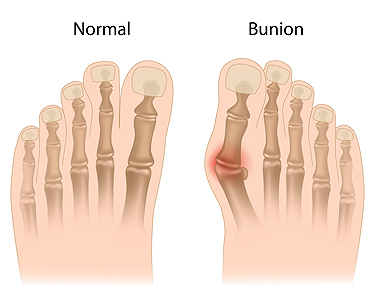
A bunion, a prevalent foot deformity, draws attention to the joint at the base of the big toe, where a bony bump forms. This condition, known as hallux valgus, gradually develops when the big toe leans inward toward the second toe, causing the metatarsal bone to protrude. Bunions can result from genetic predisposition, wearing ill-fitting shoes that squeeze the toes, or conditions such as arthritis. The gradual misalignment of the toe joint leads to inflammation, pain, and, in some cases, difficulty in finding comfortable footwear. While bunions are often associated with discomfort and aesthetic concerns, they can also impact joint function over time. Understanding the overview of bunions involves recognizing the factors contributing to their development and the potential implications on foot health. If you have a bunion, it is suggested that you visit a podiatrist who can guide you toward effective relief options.
If you are suffering from bunion pain, contact Harvey Jacobs, DPM of Quality Foot Care Center. Our doctor can provide the care you need to keep you pain-free and on your feet.
What Is a Bunion?
Bunions are painful bony bumps that usually develop on the inside of the foot at the joint of the big toe. As the deformity increases over time, it may become painful to walk and wear shoes. Women are more likely to exacerbate existing bunions since they often wear tight, narrow shoes that shift their toes together. Bunion pain can be relieved by wearing wider shoes with enough room for the toes.
Causes
- Genetics – some people inherit feet that are more prone to bunion development
- Inflammatory Conditions - rheumatoid arthritis and polio may cause bunion development
Symptoms
- Redness and inflammation
- Pain and tenderness
- Callus or corns on the bump
- Restricted motion in the big toe
In order to diagnose your bunion, your podiatrist may ask about your medical history, symptoms, and general health. Your doctor might also order an x-ray to take a closer look at your feet. Nonsurgical treatment options include orthotics, padding, icing, changes in footwear, and medication. If nonsurgical treatments don’t alleviate your bunion pain, surgery may be necessary.
If you have any questions, please feel free to contact our office located in Somerset, NJ . We offer the newest diagnostic and treatment technologies for all your foot care needs.
Understanding Rheumatoid Arthritis in the Feet
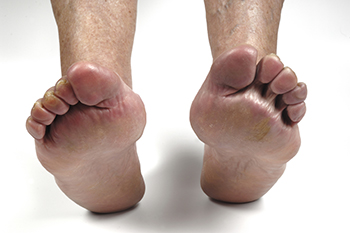
Rheumatoid arthritis, abbreviated RA, is a systemic autoimmune disorder that can have a significant impact on various parts of the body, including the feet. While it is known for joint pain and inflammation, RA's effects on the feet are particularly noteworthy. This condition can lead to deformities in the feet, such as bunions and hammertoes, causing pain and difficulty walking. RA can also cause joint swelling and tenderness in the ankles and the joints that connect the foot to the toes, known as metatarsophalangeal joints. Over time, untreated RA can result in joint erosion and severe damage to the feet, severely limiting mobility. Another critical aspect is the role of early diagnosis and treatment. Addressing RA promptly can help manage symptoms and slow the progression of the disease in the feet. Regular visits to a podiatrist are essential for those living with RA to ensure proper foot care. Understanding the facts about rheumatoid arthritis in the feet is vital for those who may be affected, as it can lead to more effective management and an improved quality of life. If you have rheumatoid arthritis that is affecting your feet, it is strongly suggested that you are under the care of a podiatrist who can offer you appropriate management tips.
Because RA affects more than just your joints, including the joints in your feet and ankles, it is important to seek early diagnosis from your podiatrist if you feel like the pain in your feet might be caused by RA. For more information, contact Harvey Jacobs, DPM of Quality Foot Care Center. Our doctor will assist you with all of your podiatric concerns.
What Is Rheumatoid Arthritis?
Rheumatoid Arthritis (RA) is an autoimmune disorder in which the body’s own immune system attacks the membranes surrounding the joints. Inflammation of the lining and eventually the destruction of the joint’s cartilage and bone occur, causing severe pain and immobility.
Rheumatoid Arthritis of the Feet
Although RA usually attacks multiple bones and joints throughout the entire body, almost 90 percent of cases result in pain in the foot or ankle area.
Symptoms
- Swelling and pain in the feet
- Stiffness in the feet
- Pain on the ball or sole of feet
- Joint shift and deformation
Diagnosis
Quick diagnosis of RA in the feet is important so that the podiatrist can treat the area effectively. Your doctor will ask you about your medical history, occupation, and lifestyle to determine the origin of the condition. Rheumatoid Factor tests help to determine if someone is affected by the disease.
If you have any questions please feel free to contact our office located in Somerset, NJ . We offer the newest diagnostic and treatment technologies for all your foot and ankle needs.


